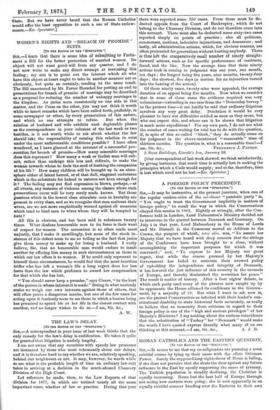WOMEN'S RIGHTS AND "BREACH OF PROMISE" SUITS.
[TO THE EDITOR OF THE uSPEOTATOR.1 SIR,—I learn that there is some idea of submitting to Parlia- ment a Bill for the better protection of married women. Its object will not want good-will from any quarter, and I do not now write to make any direct attempt at increasing this feeling ; my aim is to point out the interest which all who have this object at heart ought to take in another measure not so obviously, but quite as certainly, tending to the same result. The Bill announced by Mr. Farrer Herschel for putting an end to prosecutions for breach of promise of marriage may be described as a proposal for reducing the number of unhappy marriages in the kingdom. As juries seem consistently on one side in this matter, and the Press on the other, you may not think it worth while to insert remarks which have been called forth, probably, in some newspaper or other, by every prosecution of this nature, and which no one attempts to refute. But when the relation of husband and wife exhibits such deplorable phases as the correspondence in your columns of the last week or two testifies, is it not worth while to ask afresh whether the law should take the responsibility of causing this relation to exist
under the most unfavourable conditions possible? I have often
wondered, as I have glanced at the account of a successful pro- secution for breach of promise—How many miserable marriages -does this represent? How many a weak or foolish man will sub- mit, rather than undergo this loss and ridicule, to make the
woman towards whom he feels the seed of loathing the companion -of his life ? How many children will be brought up in an atmo- sphere either of latent hatred, or of that dull, stagnant endurance which is the substitute for hatred in natures not keen enough for it ? The feeling may not find expression in blows, perhaps,—at all events, any instance of violence among the classes where such prosecutions occur will be very rarely made known. But those passions which in the lowest class stimulate men to brutality are present in every class, and as we recognise that men maltreat their wives, are we not more emphatically warned against all measures which tend to bind men to wives whom they will be tempted to .hate?
All this is obvious, and has been said in substance twenty
times. What deafens honourable men to its force is their want -of respect for women. The accusation is so often made most unjustly, that I make it unwillingly, but none of the stock in- stances of this defect seem to me so telling as the fact that juries give them money to make up for losing a husband. I verily believe, Sir, that no honourable man would endure to insult -another by offering him money in such circumstances as those in which our law offers it to women. If he could only represent to himself those circumstances, he would feel that the most heartless .trifler who has left a woman's life a long regret does her less harm than the law which professes to award her compensation for that which she has lost.
"You should never keep a promise," says Cicero, "to the hurt of the person in whose interest it is made." Seeing in what unsteady scales we weigh our own interests against those of others, that will often prove a dangerous maxim, but one of the few cases for acting upon it fearlessly seem to me those in which a human being has promised to spend his or her life in the closest contact with .another, and no longer wishes to do so.—I am, Sir, &c., A. W.


































 Previous page
Previous page